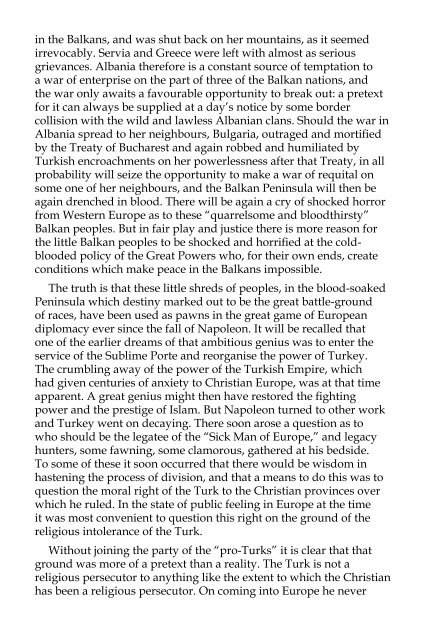Bulgaria e-book - iMedia
Bulgaria e-book - iMedia
Bulgaria e-book - iMedia
Create successful ePaper yourself
Turn your PDF publications into a flip-book with our unique Google optimized e-Paper software.
in the Balkans, and was shut back on her mountains, as it seemed<br />
irrevocably. Servia and Greece were left with almost as serious<br />
grievances. Albania therefore is a constant source of temptation to<br />
a war of enterprise on the part of three of the Balkan nations, and<br />
the war only awaits a favourable opportunity to break out: a pretext<br />
for it can always be supplied at a day’s notice by some border<br />
collision with the wild and lawless Albanian clans. Should the war in<br />
Albania spread to her neighbours, <strong>Bulgaria</strong>, outraged and mortified<br />
by the Treaty of Bucharest and again robbed and humiliated by<br />
Turkish encroachments on her powerlessness after that Treaty, in all<br />
probability will seize the opportunity to make a war of requital on<br />
some one of her neighbours, and the Balkan Peninsula will then be<br />
again drenched in blood. There will be again a cry of shocked horror<br />
from Western Europe as to these “quarrelsome and bloodthirsty”<br />
Balkan peoples. But in fair play and justice there is more reason for<br />
the little Balkan peoples to be shocked and horrified at the coldblooded<br />
policy of the Great Powers who, for their own ends, create<br />
conditions which make peace in the Balkans impossible.<br />
The truth is that these little shreds of peoples, in the blood-soaked<br />
Peninsula which destiny marked out to be the great battle-ground<br />
of races, have been used as pawns in the great game of European<br />
diplomacy ever since the fall of Napoleon. It will be recalled that<br />
one of the earlier dreams of that ambitious genius was to enter the<br />
service of the Sublime Porte and reorganise the power of Turkey.<br />
The crumbling away of the power of the Turkish Empire, which<br />
had given centuries of anxiety to Christian Europe, was at that time<br />
apparent. A great genius might then have restored the fighting<br />
power and the prestige of Islam. But Napoleon turned to other work<br />
and Turkey went on decaying. There soon arose a question as to<br />
who should be the legatee of the “Sick Man of Europe,” and legacy<br />
hunters, some fawning, some clamorous, gathered at his bedside.<br />
To some of these it soon occurred that there would be wisdom in<br />
hastening the process of division, and that a means to do this was to<br />
question the moral right of the Turk to the Christian provinces over<br />
which he ruled. In the state of public feeling in Europe at the time<br />
it was most convenient to question this right on the ground of the<br />
religious intolerance of the Turk.<br />
Without joining the party of the “pro-Turks” it is clear that that<br />
ground was more of a pretext than a reality. The Turk is not a<br />
religious persecutor to anything like the extent to which the Christian<br />
has been a religious persecutor. On coming into Europe he never<br />
sought, for example, to destroy the Greek Church, and I do not think<br />
that there is any clear evidence that Turkish misrule was founded<br />
at any period on intolerance carried to the degree of murder for<br />
faith’s sake. The fault rather of the Porte’s rule was the dreadful<br />
corruption and incompetence of the Turk as an administrator and<br />
the Turkish ideas of the status of women-folk—ideas which gave to<br />
Moslem women rights derived from their Moslem men-relatives, but<br />
regarded Christian women as if they were cattle without owners.<br />
I think that it was the adoption by European Powers of religion<br />
as a pretext for interfering in the Balkans which has been largely<br />
responsible for the religious bitterness there. It would make the<br />
situation more clear and give a better hope for the future if Western<br />
Europe would frankly recognise that the fervid interest taken in<br />
the Balkan Peninsula for about a century has had no other reason<br />
generally than territory-hunger.<br />
When Turkey began showing signs of falling to pieces, Russia<br />
made an early claim to the succession of “the Sick Man’s” estate.<br />
Russia wanted a warm water-port; and her territories would have<br />
been nicely rounded off by the acquisition of Turkey in Europe.<br />
These were the real reasons, not publicly expressed, for her Balkan<br />
policy. Less real reasons, kept in the foreground, were that the head<br />
of the Russian Orthodox Church was at Constantinople, that Russia<br />
was the kinsman of the Slav populations in the Balkans, and that<br />
her duty and right was to liberate co-religionists who were suffering<br />
from religious persecution.<br />
Great Britain was the great obstacle to the desire of Russia to<br />
march down upon Constantinople. Her real objection was that with<br />
Russia on the Bosphorus the control of the Mediterranean might<br />
pass into the hands of the rival who seemed to wish to dispute with<br />
her for the mastery of India. Her expressed reasons had some vague<br />
declarations about the “chivalry of the Turk.” Austria developed<br />
her ambition to suzerainty over the Balkan Peninsula mainly on the<br />
strength of a claim to be the heir of the old Holy Roman Empire, and<br />
as such possessing an hereditary right to rule over the old seat of<br />
that Empire in the East. Italy was forced into a Balkan policy by the<br />
impossibility of allowing a rival Power to settle on the other side of<br />
the Adriatic, threatening her whole east coast. Germany and France<br />
came into Balkan politics chiefly as allies of Powers with more direct<br />
interests, although both have now fears and hopes regarding the<br />
Asiatic dominions of the Sublime Porte and shape their Balkan policy<br />
accordingly.





